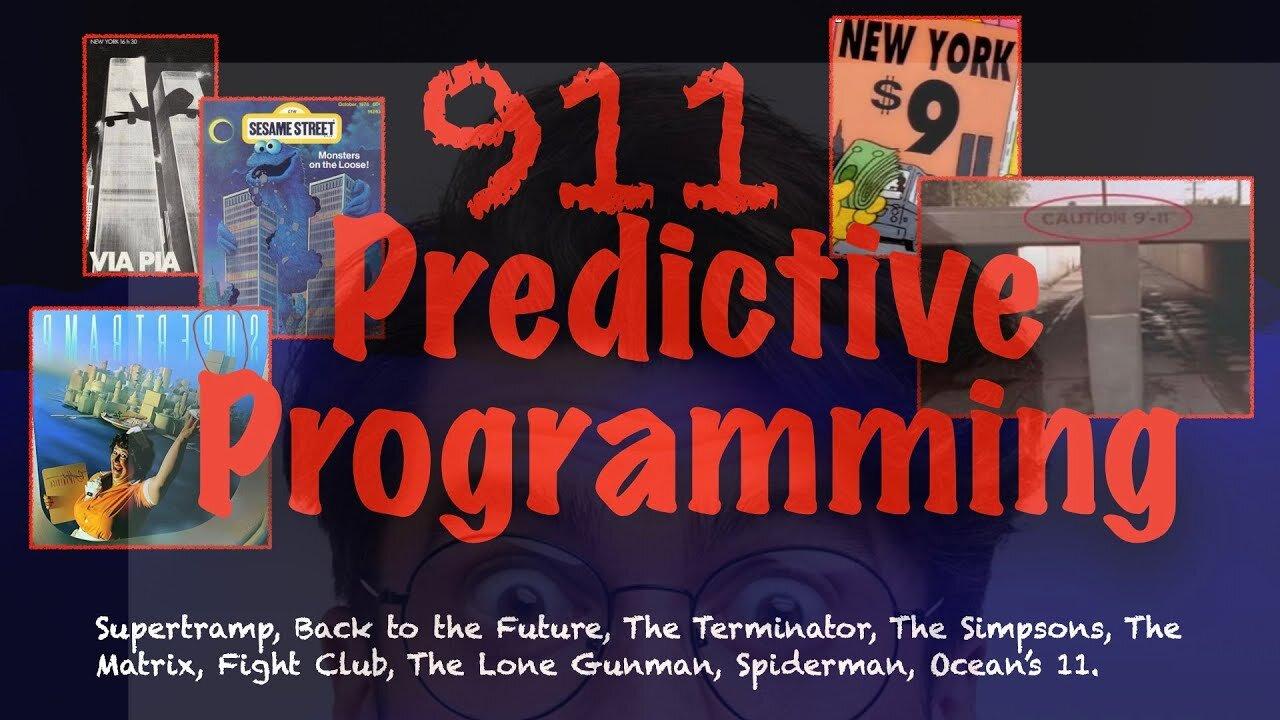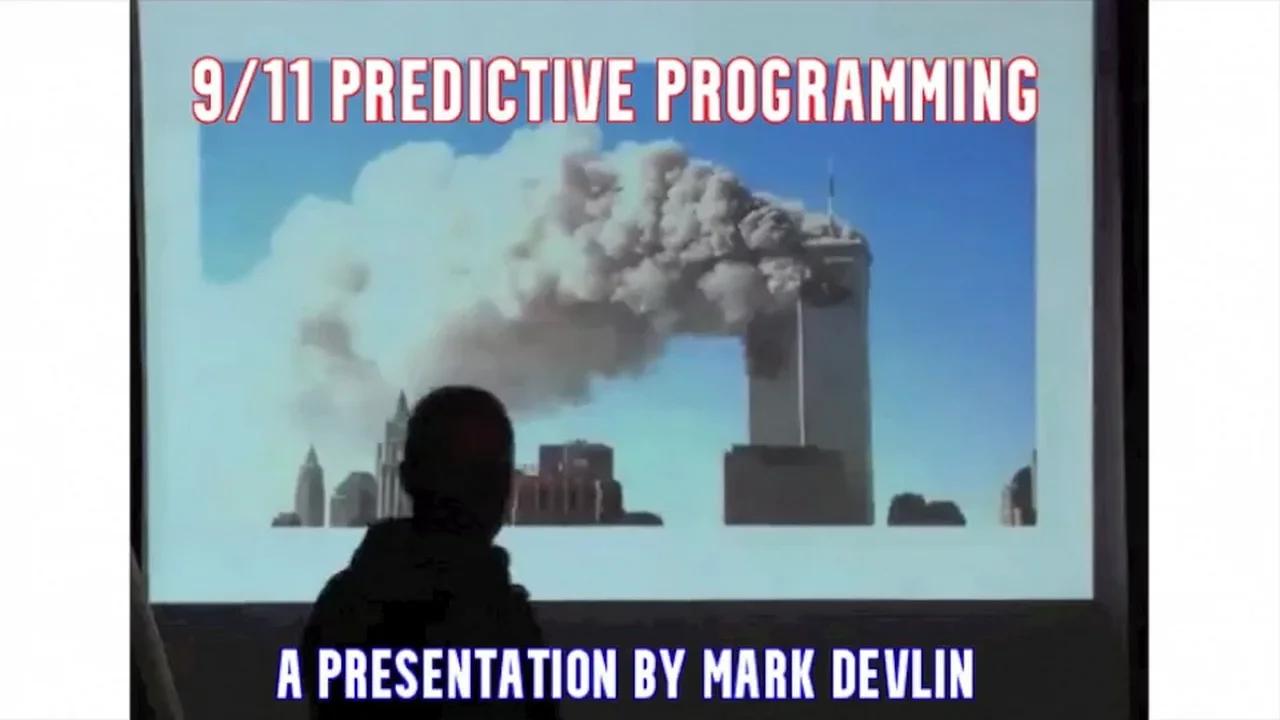9/11 Predictive Programming: Unveiling Foreshadowing In Media
Is it possible that the events of September 11, 2001, were not only a tragic culmination of circumstances but also a carefully orchestrated event, hinted at in the very fabric of our popular culture? The theory of "9/11 predictive programming" proposes that the attacks were foreshadowed in various forms of media, effectively "grooming" the public to accept the unthinkable.
The concept of predictive programming, as a tool to influence public perception, has gained significant traction in recent years, particularly in discussions surrounding the 9/11 attacks. Conspiracist Alan Watt coined the term and suggests that ideas, situations, and new technologies are strategically embedded in movies, television shows, and books. The goal, according to this theory, is to subtly manipulate the population into accepting societal changes.
The echoes of this "preemptive mass manipulation" are claimed to resonate across a wide spectrum of media, from seemingly innocuous animated series like "The Simpsons" to Hollywood blockbusters like "Fight Club." Proponents of the predictive programming theory point to numerous instances where imagery, plotlines, and even subtle references seem to eerily anticipate the events of that fateful day. This has sparked intense debates among experts and the general public, with some viewing these theories as legitimate concerns, while others dismiss them as baseless speculation.
The 9/11 Truther movement, for instance, draws extensively on this interpretative framework, particularly regarding the events that preceded the attacks. It raises parallels to historical instances, such as the accusations leveled against Franklin D. Roosevelt, with the idea that those in power may have foreknowledge of major tragedies.
This concept is further complicated by the notion of psychological priming. The idea is that by repeatedly exposing individuals to certain images, concepts, or scenarios, their minds are subtly prepared to accept or even normalize those very things when they manifest in reality. In the context of 9/11 predictive programming, this means that movies, television shows, and other media may have been used to desensitize the public to the idea of a large-scale terrorist attack on American soil.
In essence, predictive programming suggests a deliberate attempt to influence public perception and shape societal reactions to potentially disruptive events. Proponents argue that by repeatedly exposing the public to certain scenarios in fictional contexts, resistance to those events is minimized when they eventually occur in real life. This, in turn, might make the implementation of policies or the acceptance of changes easier for those in power.
The exploration of 9/11 predictive programming delves into the symbolism embedded in the media, its an idea that there is a deep layer of meaning in the seemingly harmless entertainment that we consume daily.
One of the most frequently cited examples of predictive programming is the animated television series, "The Simpsons." Episodes of this long-running show have been scrutinized for their alleged prophetic nature, with some scenes appearing to depict events that later transpired in the real world.
Consider the episode titled "The City of New York vs. Homer Simpson." In this episode, a brochure displays the phrase "$9 a day" with the twin towers in the background. Such instances, however, have added fuel to the debate, sparking a great deal of curiosity and conjecture about the nature of the connection. These references have fueled the debate around predictive programming, sparking curiosity.
These instances are often framed not as clairvoyance but as instances of the subtle manipulation designed to affect how society perceives change. One of the mechanisms underlying the predictive programming concept is psychological "priming." Priming is the idea of exposing someone to a stimulus in order to make them more receptive. The aim of the programming is to reduce resistance to events.
The number of potential examples of this concept is truly striking. In some instances, these examples are specific and undeniable, while in others, they are more conceptual.
For instance, in the movie "Fight Club," released in 1999, several scenes contain apparent references to the events of 9/11. The film's themes of chaos, societal breakdown, and the destruction of iconic buildings have been interpreted as foreshadowing the attacks.
The concept of 9/11 predictive programming is not only about specific instances, it also touches upon broader themes and societal shifts. The theory posits that various forms of media serve to normalize potentially troubling concepts, thereby conditioning the public to accept those changes more readily. This may include new technologies, government policies, or shifts in social norms.
This is just one of many conspiracy theories related to the events of September 11. These theories are very diverse. But they all involve secretive government plans and complex plots. They contradict accepted views and cannot be validated by scientific methods. They are not to be confused with validated conspiracies.
The idea of the "Illuminati" as a driving force behind predictive programming, as a controlling force behind predictive programming, is a common trope among conspiracy theorists. This theory suggests that an elite group of individuals seeks to influence global events. The debate around predictive programming continues to captivate and stir passions.
These types of predictive programming aren't so specific. But are predictive because they reflect a way of life. Many believe these are warnings rather than intentional predictive programming. The discussion is ongoing, and it encourages reflection. It's a call to analyze the events in the media.
The theory surrounding predictive programming presents a compelling challenge, prompting us to examine the subtle ways the media shapes our comprehension of the world. Though it has numerous detractors, the concept of 9/11 predictive programming is a thought-provoking case study in how we process information. It also shows the power of art.
The concept of predictive programming is a complex one, and there are many differing views on its validity and utility. Some see it as a method of preemptive mass manipulation or mind control, while others dismiss it as unfounded conjecture. Whether it's viewed as a legitimate phenomenon or not, the theory of predictive programming provokes thought and is important to acknowledge.
This article is for informational and educational purposes only, and does not provide medical, legal, or any other type of professional advice.


